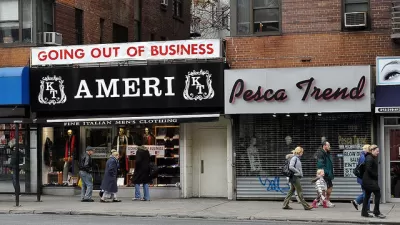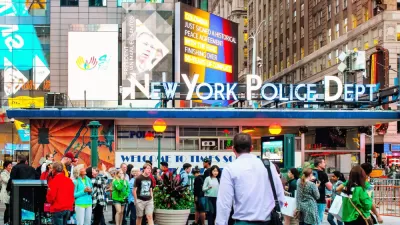Over the weekend it was announced that New York City will need to demolish hundreds of homes damaged during Superstorm Sandy. The complicated process for determining what will be rebuilt has yet to begin.
At least 200, and up to 500 more, one- and two-family houses in Staten Island, Queens and Brooklyn were so damaged by the storm that "they pose a danger to public safety and other buildings nearby," and are facing imminent demolition, reports William K. Rashbaum. In an interview late last week, Robert L. LiMandri, commissioner of the city's Buildings Department, "said neither he nor his staff could recall the city ever undertaking this kind of broad reshaping of its neighborhoods."
“We’ve never had this scale before,” Mr. LiMandri said. “This is what New Yorkers have read about in many other places and have never seen, so it is definitely unprecedented. And by the same token, when you walk around in these communities, people are scared and worried, and we’re trying to make every effort to be up front and share with them what they need to do.”
Complicating matters, many of the owners of the structures facing demolition are scattered elsewhere - "with friends or family or in hotels or shelters" - and may be difficult to contact before their properties are torn down, especially where the danger is imminent.
“This is not easy, in this case, because of all these displaced people, but we’re going to do the best we can, but we may have to move on it if we can’t find them,” Mr. LiMandri said.
"Eric A. Ulrich, a Republican city councilman from Queens who represents Breezy Point, Belle Harbor, Broad Channel and some of the other affected neighborhoods, said that he had not been notified of the demolitions, but that the forced destruction of people’s homes would come as a terrible shock," writes Rashbaum.
“My constituents have been through so much, and they are just so distraught, and if that were to happen and if they were told that the home that they grew up in or they bought has to be taken against their will, it’s just devastating news,” Ulrich said.
FULL STORY: New York City Will Demolish Hundreds of Storm-Hit Homes

Planetizen Federal Action Tracker
A weekly monitor of how Trump’s orders and actions are impacting planners and planning in America.

Maui's Vacation Rental Debate Turns Ugly
Verbal attacks, misinformation campaigns and fistfights plague a high-stakes debate to convert thousands of vacation rentals into long-term housing.

San Francisco Suspends Traffic Calming Amidst Record Deaths
Citing “a challenging fiscal landscape,” the city will cease the program on the heels of 42 traffic deaths, including 24 pedestrians.

Amtrak Rolls Out New Orleans to Alabama “Mardi Gras” Train
The new service will operate morning and evening departures between Mobile and New Orleans.

The Subversive Car-Free Guide to Trump's Great American Road Trip
Car-free ways to access Chicagoland’s best tourist attractions.

San Antonio and Austin are Fusing Into one Massive Megaregion
The region spanning the two central Texas cities is growing fast, posing challenges for local infrastructure and water supplies.
Urban Design for Planners 1: Software Tools
This six-course series explores essential urban design concepts using open source software and equips planners with the tools they need to participate fully in the urban design process.
Planning for Universal Design
Learn the tools for implementing Universal Design in planning regulations.
Heyer Gruel & Associates PA
JM Goldson LLC
Custer County Colorado
City of Camden Redevelopment Agency
City of Astoria
Transportation Research & Education Center (TREC) at Portland State University
Jefferson Parish Government
Camden Redevelopment Agency
City of Claremont





























